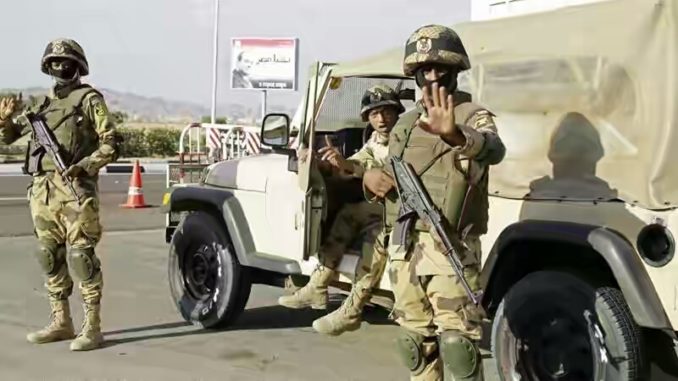
ISIL fighters ambushed a police convoy in Egypt’s Sinai Peninsula on Monday, killing 18 officers and wounding seven others in one of the deadliest attacks this year in the restive region.
Police and military officials said roadside bombs destroyed and set ablaze four armoured vehicles and a fifth one carrying signal jamming equipment. The gunmen later opened fire with assault weapons and commandeered a police pick-up truck truck.
Among those killed were two police lieutenants. The wounded included a police brigadier general. The officials spoke on condition of anonymity because they were not authorised to brief media.
Islamic State of Iraq and the Levant (ISIL) claimed responsibility for the attack in a brief statement carried by its Aamaq website.
The attack took place about 30km west of el-Arish in northern Sinai, the epicentre of a long-running rebellion now led by an ISIL affiliate.
The Ministry of Interior confirmed in a statement that the attack on Monday took place and several policemen were killed or wounded. It did not provide any casualty figures.
The prime minister’s office called it a “traitorous incident”.
“Prime Minister Sherif Ismail affirmed the state’s determination to fight these criminal actions that target the safety and will of citizens with its full force,” a government statement said.
Monday’s attack was the deadliest against security forces since July when ISIL attacked a remote army outpost in the border town of Rafah, killing 23 soldiers. That was the deadliest attack in two years.
The ambush came a day after authorities said they had caught a cell planning attacks in the capital, Cairo. Police said they killed 10 fighters in two simultaneous raids on apartments in a densely populated Cairo neighbourhood. They said the fighters had sneaked into the capital from northern Sinai but did not say whether they were members of ISIL.
El-Arish, the capital of North Sinai province, has been a site of regular conflict between government forces and ISIL fighters in recent months.
Egypt has battled fighters in Sinai for years, but the rebellion became far more deadly after the 2013 military removal of Mohamed Morsi.
Al Jazeera’s Middle East analyst Yehia Ghanem said the intensified violence in Sinai over the last four years has been used by the Egyptian government to escalate repression throughout the country.
“The Egyptian regime has initiated violence in the Sinai – all over the country but specifically in Sinai. It’s a rule – violence begets violence,” he said.
The Sinai Peninsula borders Israel and the Gaza Strip.